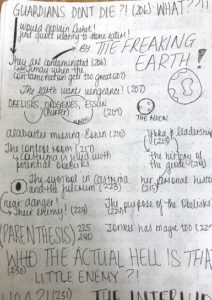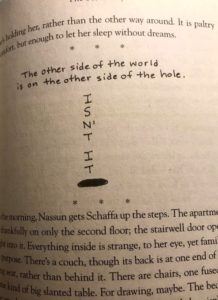Following the plot of N.K Jemisin’s trilogy has been a task I was only able to cope with by writing things down. Being aware of my forgetful habits, I realized very early on the semester that I needed to find a method of staying organized. Well…at least that was my intention. What was to be a structured arsenal of literary evidence quickly became a playground for whimsical cartoons and occasional freakouts. The more I wrote, the less it became about hoping I didn’t forget and instead focused on replicating my emotions on paper. So when I read The Stone Sky and came across Alabaster’s own record-keeping, I started making some connections with my own, and I wrote them down.
 To the right I’ve provided an example of one of the pages from my note-taking. Decorated with drawings of the moon and the earth, arrows connecting lines of thought, and all too real—and possibly irrational—reactions like: “THE FREAKING EARTH!” and “WHO THE ACTUAL HELL IS THAT?! LITTLE ENEMY?!”, it is truly a maddening piece of work. Though, I must admit that it has fulfilled it’s function considering that each word, reaction and drawing is referenced with a page number (though even without them I could navigate through this cobweb of information).
To the right I’ve provided an example of one of the pages from my note-taking. Decorated with drawings of the moon and the earth, arrows connecting lines of thought, and all too real—and possibly irrational—reactions like: “THE FREAKING EARTH!” and “WHO THE ACTUAL HELL IS THAT?! LITTLE ENEMY?!”, it is truly a maddening piece of work. Though, I must admit that it has fulfilled it’s function considering that each word, reaction and drawing is referenced with a page number (though even without them I could navigate through this cobweb of information).
When considering what led to my inevitable incorporation of drawings and other illustrations I am constantly reminded of being influenced by the blankness on the page. Now, stay with me for a second! My notebook is not lined—though it has a dot grid formation—and I think the absense of page lining gave me the opportunity (want?) to be more expressive. One of ways that The Online Etymology Dictionary describes the word “blank” is being : “void of expression”. The need to fill my pages—even if it was with doodles and other nonsensical scribbles— is something that resulted from being presented with an emptiness that didn’t ask anything of me but to be written on. And this is something that seems to call Alabaster as well.

In The Stone Sky when in Corepoint, Alabaster began a journal and to the right I’ve included one of his later entries, a drawing. Anyone who reads through Alabaster’s journalling, scattered across pages 287-300, can’t help but notice him slipping deeper into a form of madness. He himself acknowledges this when he expresses his hopes that writing would: “Preserve my words for eternity! Ha! Longer than my rusting sanity” (288), and as his words go on we witness a loosening of his grip on reality. Regardless of how “mad” Alabaster becomes, however, I would like to revisit one of the factors that calls him to writing anything down at all. In the first entry we are given Alabaster begins with: “Found these books, blank.” (287) then a couple lines later: “Don’t know what to write” (288). It is true that Alabaster’s perception of the nature of stone eaters influence the feeling of isolation and presents a reason for him to write, but I am inclined to think that the blankness of the books also gave Alabaster an opportunity.
By comparing myself to a character that is constantly thought of as being “crazy” I slightly discredit my attempts at explaining a portion of his—our—drive to fill a blank space. So I want to clarify, as I conclude, that this post is trying to shed light on the possibility that blankness— nothingness, spaces, emptiness—calls for expression. Personal expression, without external pressures or expectations. Expression that results from reflection. Deeply internalized emotions regurgitated on blankness.
Or maybe we’re both just crazy.
